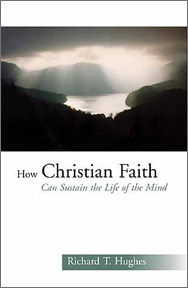Multimedia Reference Religion Travel |
 How Christian Faith Can Sustain the Life of the Mind Richard T. Hughes
Description From The Publisher: Can Christian faith sustain the life of the mind? To many academics this question seems absurd. In their judgment, religion is fundamentally dogmatic while the life of the mind requires openness, creativity, and imagination. This stereotypical assumption about the nature of religion in general, and Christianity in particular, has contributed significantly over the past century to the divorce between faith and learning at countless colleges and universities in the United States. But is this assessment of the intellectual nature of faith justified, or the academic rift it has opened? In this powerful yet very personal reflection on faith and scholarship, Richard T. Hughes counters the widespread perception of Christians as steeped in narrowness and dogmatism and provides a compelling argument that faith, properly pursued, in fact nourishes the openness and curiosity that make a life of the mind possible. Neither an assessment of church-related higher education today nor a lamentation over the process of secularization, this book is instead a badly needed aid for academics in both private and public institutions who want to connect Christian faith with scholarship and teaching in meaningful and effective ways. Defining the "life of the mind" in terms of disciplined search for truth, conversation with diverse viewpoints, critical analysis, and intellectual creativity, Hughes shows that such life, far from being impeded by Christian faith, can actually be enhanced by it but only if Christians learn to think theologically and break through the particularities of their traditions. Hughes first examines the way that the Deism of the Founding Fathers defines the values of the modern academy in the United States, and he asks how the Christian tradition might interact with these values in meaningful ways. He then looks at four different Christian traditions Catholic, Lutheran, Reformed, and Mennonite and the different ways they sustain the life of the mind. When he turns to teaching, Hughes uses his own classroom work as an illustration of how a commitment to some of the great themes of Christian theology can undergird both the form and the content of the teaching task. Finally, in an especially poignant chapter, Hughes explores how good teaching and scholarship can be rooted in human suffering and tragedy. Reviews Reader's Index Send us your favorite quotes or passages from this book. About the Author Distinguished Professor of Religion and director of the Center for Faith and Learning at Pepperdine University in Malibu, California. A scholar and teacher for more than thirty years, he has written extensively on both American religious history and the relation between Christianity and American higher education. Among the books he has written or edited areIllusions of Innocence: Protestant Primitivism in America, 16301875; The American Quest for the Primitive Church; and The Primitive Church in the Modern World. Table of Contents
Customer Reviews Write your own online review. Look for Similar Books by Subject
| ||||||||||||||||||||||||||||||||||
Copyright ©1996-2011 CenturyOne Bookstore. All Rights Reserved. All prices subject to change and given in U.S. dollars. Your purchase from CenturyOne.com will assist the CenturyOne Foundation in providing funding for various archaeological and research projects which seek to provide more information about the period of the First Century C.E., the origins of Christianity and the world of the Bible in general. All materials contained in http://www.centuryone.com are protected by copyright and trademark laws and may not be used for any purpose whatsoever other than private, non-commercial viewing purposes. Derivative works and other unauthorized copying or use of stills, video footage, text or graphics is expressly prohibited. |

